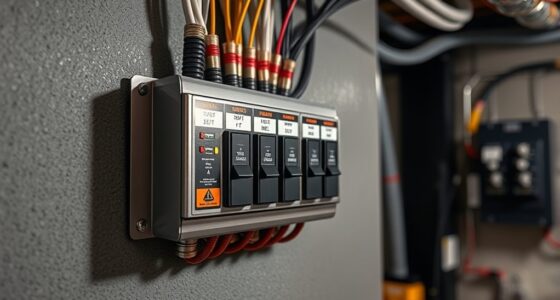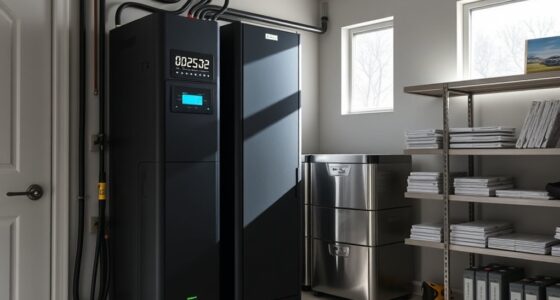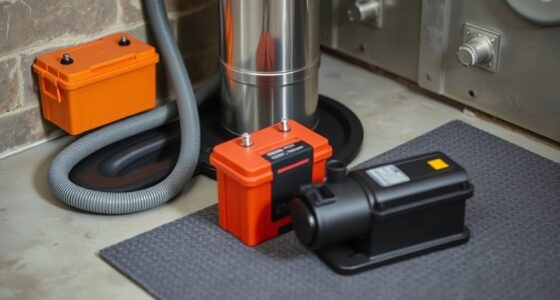When choosing backup power, propane generators often perform better in real-world outages, running more quietly and producing fewer emissions, which keeps your home and environment safer. They’re easier to handle and start reliably in cold weather, making them more convenient during long outages. While gasoline is cheaper and widely available, it requires more maintenance and poses more safety risks. To guarantee your system works when needed, understanding safety, storage, and maintenance details is essential—so keep exploring these points further.
Key Takeaways
- Propane generators operate more quietly and produce fewer emissions, making them better for indoor use and neighborhood comfort.
- Gasoline units are generally cheaper upfront and more widely available, but require careful handling and regular refueling.
- Propane offers longer-term reliability with stable fuel prices and easier storage, reducing mess and safety concerns.
- Gas generators may require more maintenance and are prone to noise and emissions, impacting environmental and user experience.
- For consistent performance during outages, consider ease of operation, fuel availability, safety, and environmental impact when choosing between gas and propane.
Real-World Performance in Power Outages
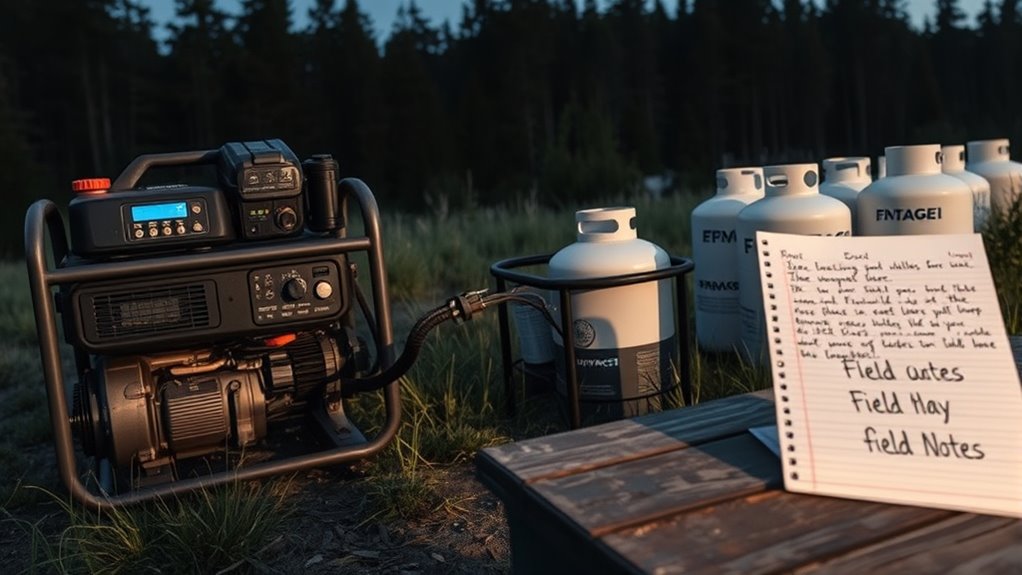
When a power outage hits, your backup power source needs to kick in quickly and reliably. Gas generators often start smoothly but can produce loud generator noise, which might disturb your household or neighbors. Propane units tend to operate more quietly, making them better for maintaining peace during outages. Regarding environmental impact, propane burns cleaner than gasoline, releasing fewer emissions and pollutants. This means less smog and a smaller carbon footprint, which is better for the environment. Gas generators, while sometimes more powerful, tend to produce more noise and emissions, increasing their environmental impact. Additionally, color accuracy in the operation of some models can influence the overall experience, especially if the generator is used in a setting where visual indicators and gauges are important. When choosing between the two, consider how noise levels and environmental concerns matter to you, especially if outages are frequent or happen during quiet times.
Ease of Use and Convenience Factors
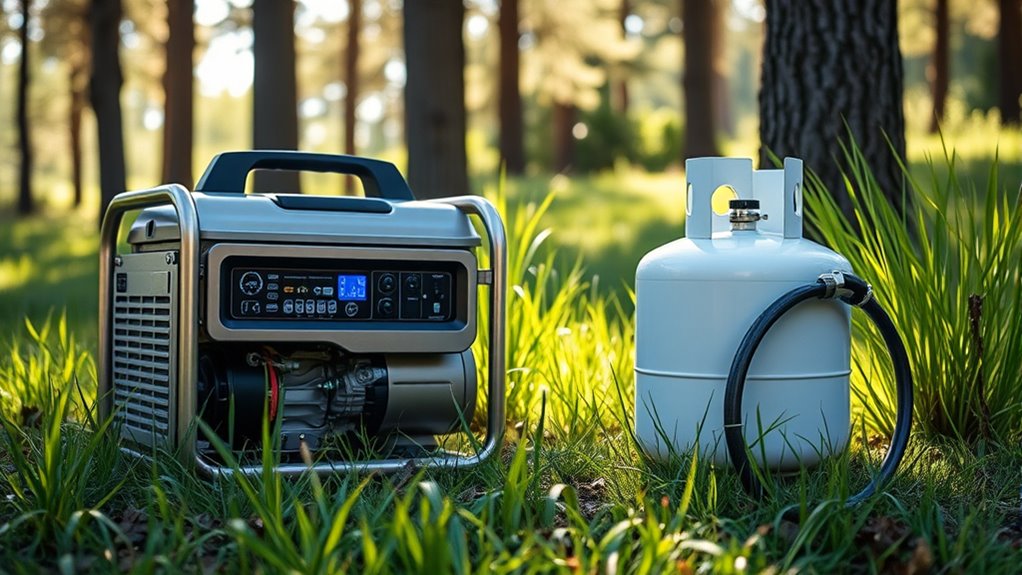
Choosing between gas and propane generators depends heavily on ease of use and convenience. Gas generators typically require you to handle fuel carefully, dealing with storage tanks or refilling from a gas station, which can be less user-friendly. Propane generators, on the other hand, offer straightforward fuel handling through portable tanks, making refills quick and clean. Propane’s sealed tanks reduce mess and eliminate fuel spills, enhancing user friendliness. Gas generators may need more maintenance and attention to ensure proper fuel flow, especially during long outages. Propane systems tend to start more reliably in cold weather and are generally easier to operate, making them a more convenient choice for many users. Additionally, the trustworthiness of brands can influence your confidence in the reliability and safety of your backup power system. Ultimately, your choice depends on how simple and hassle-free you want your backup power setup to be.
Cost and Availability of Fuel Types
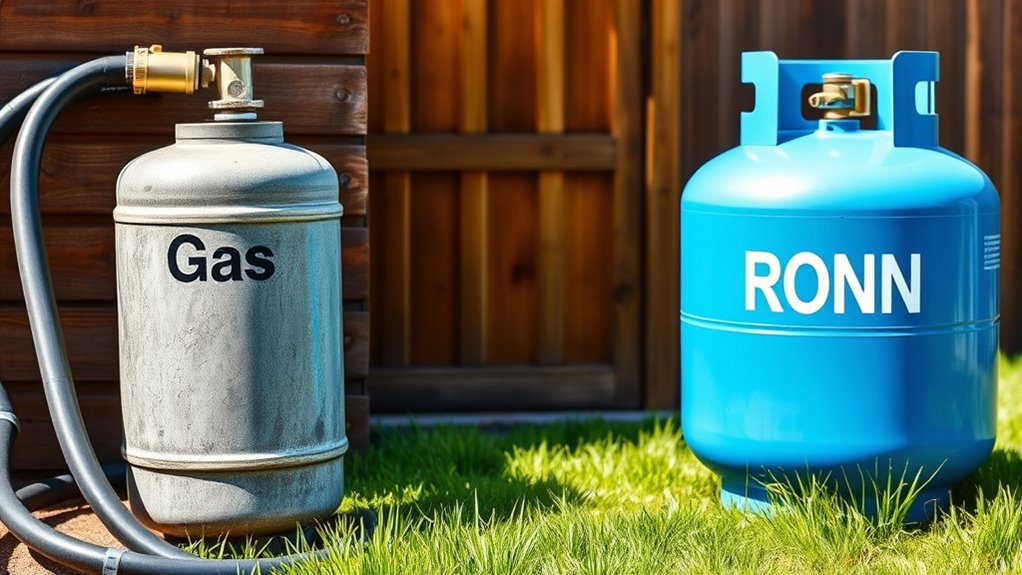
Fuel costs and availability can considerably impact your backup power setup, and understanding the differences between gas and propane is essential. Gasoline generally has a lower fuel cost but may fluctuate with market prices and seasonal demand. It’s widely available at gas stations, making it easier to refuel when needed. Propane, on the other hand, tends to have a higher initial cost for tanks and equipment but offers more stable fuel prices over time. Its availability depends on local suppliers and propane distribution networks, which might be limited in some areas. If you need a reliable backup, consider how easily you can access each fuel type and how their costs fit within your budget. Both options have their pros and cons in terms of fuel cost stability and availability. Refueling options can also influence your choice between the two fuels.
Storage and Safety Considerations
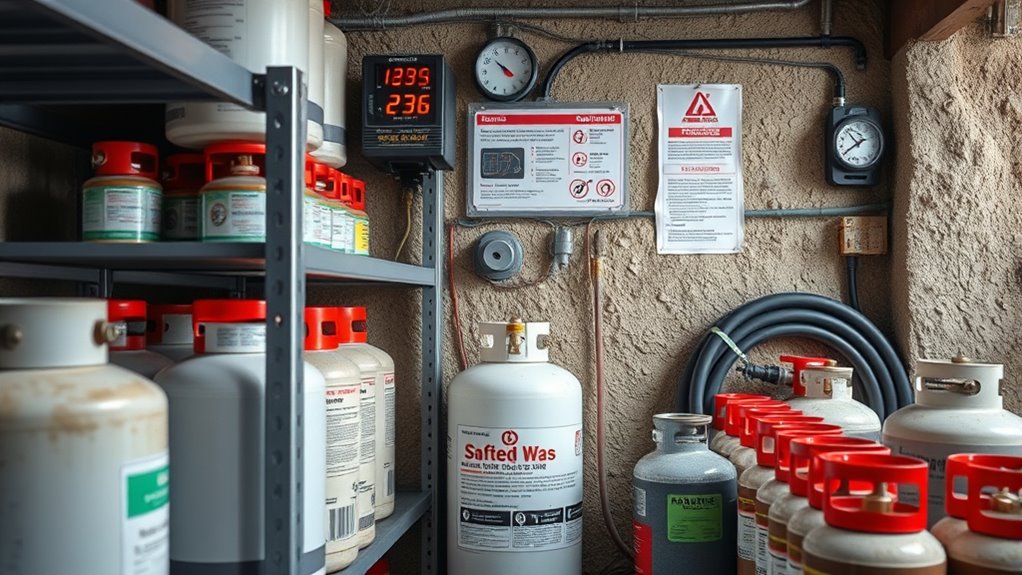
Proper storage and safety measures are essential because both gasoline and propane pose specific risks if not handled correctly. You must ensure tank safety by storing fuels in approved containers and away from heat sources. Using proper storage solutions reduces the chance of leaks or explosions. Keep fuels in well-ventilated areas, and avoid storing them indoors or near living spaces. Additionally, understanding the horsepower of electric dirt bikes can help you assess the power and safety features of certain models used for backup power applications.
Long-Term Reliability and Maintenance
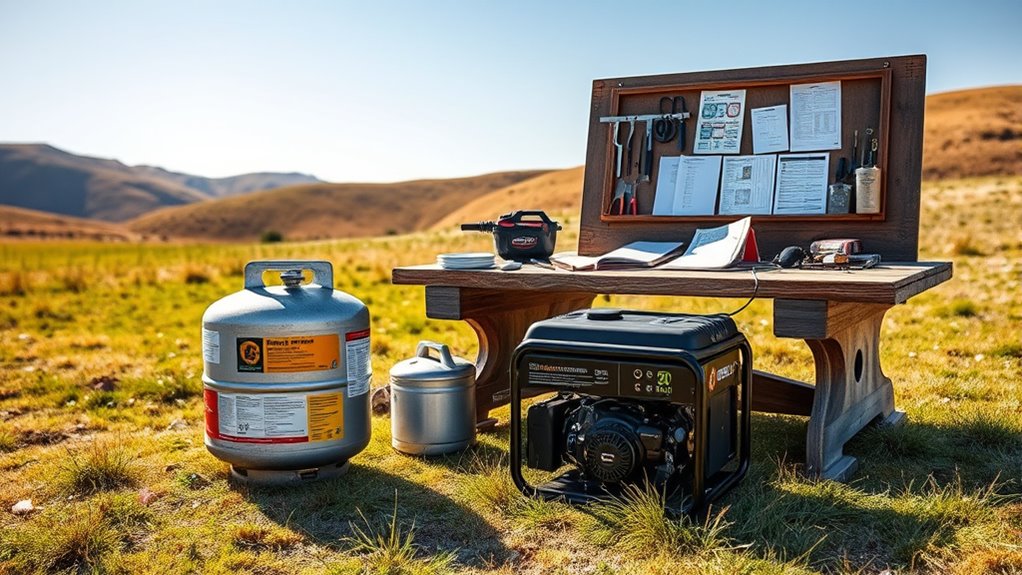
Regular maintenance and proactive care are essential to guarantee your backup power system remains reliable over time. You need to monitor fuel storage regularly, ensuring tanks are secure and free of leaks. Proper fuel storage prevents contamination and degradation, which can impair system performance. Maintenance frequency varies depending on usage and manufacturer recommendations, but inspecting filters, connections, and fuel quality should be part of your routine. For gas, check for corrosion and leaks, while propane tanks require valve inspections and pressure checks. Consistent upkeep reduces the risk of breakdowns during emergencies. Additionally, understanding long-term reliability and following recommended maintenance schedules help ensure your system functions when you need it most. By staying on top of fuel storage conditions and adhering to maintenance schedules, you’ll maximize your system’s long-term reliability, ensuring it functions when you need it most.
Frequently Asked Questions
Which Fuel Type Is More Environmentally Friendly for Backup Power?
You’ll find that propane is generally more environmentally friendly than gas for backup power. It produces a lower carbon footprint and burns cleaner, making it a better choice among renewable options. By choosing propane, you help reduce emissions and support a greener future. While both fuels have impacts, propane’s cleaner burn makes it the smarter option if you want to minimize your environmental impact during power outages.
How Do Weather Conditions Affect Gas and Propane Performance?
Weather conditions can critically impact gas and propane performance. Temperature fluctuations may cause gas to thicken in cold weather, making it harder to ignite, while propane generally performs better in low temperatures. Moisture impact is also vital; humidity and condensation can clog fuel lines or cause corrosion, reducing efficiency. To guarantee reliable backup power, you should store fuel properly and consider weather-resistant equipment, especially in extreme weather conditions.
Are There Any Legal Restrictions on Storing Large Fuel Quantities?
You might think storing large fuel quantities is a free-for-all, but surprisingly, there are strict storage regulations and legal restrictions you need to follow. Local laws often limit how much fuel you can keep on-site and require specific containers and safety measures. Ignoring these rules could lead to fines or safety hazards. So, even in the name of preparedness, make sure you check your area’s legal restrictions before stockpiling fuel.
Can Gas or Propane Be Used Safely Indoors for Backup Power?
You can’t use gas or propane safely indoors for backup power because of indoor safety concerns. Fuel storage must be kept outside in well-ventilated areas, away from heat sources or open flames, to prevent leaks and explosions. Always follow local regulations and manufacturer instructions, and use proper containers designed for fuel storage. Prioritize safety, and never attempt to run backup generators indoors or in enclosed spaces.
What Are the Best Practices for Emergency Fuel Storage and Handling?
You should prioritize fuel container safety by storing fuels in approved, clearly labeled containers, away from heat sources or open flames. Keep storage temperatures moderate—ideally between 60-80°F—to prevent pressure buildup or leaks. Regularly inspect containers for damage, corrosion, or leaks, and store fuels in well-ventilated areas outdoors if possible. Proper handling and safe storage practices guarantee your backup fuel remains safe and ready when you need it most.
Conclusion
So, whether you choose gas or propane, know that both promise to keep your lights on—at least until they don’t. While propane’s long shelf life and cleaner burn seem ideal, gas’s instant availability might tempt you in a pinch. Ultimately, your decision hinges on patience, storage space, and your faith in technology. Because nothing says “peace of mind” like an unreliable backup power system—it’s almost poetic, isn’t it?


